Alyce Alternatives
Searching for Alyce alternatives? This guide offers a direct comparison of 10 platforms, covering features, pricing, and key differences.

You might use Alyce for its personalized gifting and ease of use. The platform performs well when you need to engage clients or reward customers. It helps sales and marketing teams open doors and build relationships through thoughtful, personal gifts.
However, some users note limitations like a narrow range of gift options and geographical restrictions. This might be why you seek an alternative. We've analyzed the top options to help you choose. Let's get started.
Try 11x for Digital Sales Workers
If your goal is to add digital workers to your sales process, 11x is a relevant option. The platform provides autonomous agents for tasks like lead research and outreach. This allows your sales team to focus on the final sale.
11x is a GTM platform that uses AI agents to manage the sales process. It consolidates functions like data enrichment, outreach, and email warmup, which removes the need for separate point solutions.
The platform has two primary agents. Alice finds prospects, conducts outreach on email and LinkedIn, and keeps the CRM updated. Julian qualifies inbound leads and schedules meetings.
Alyce Alternatives
Here is a detailed review of the main alternatives to Alyce. We examine each option's pricing, core features, and compare its advantages and drawbacks relative to Alyce.
1) Sendoso
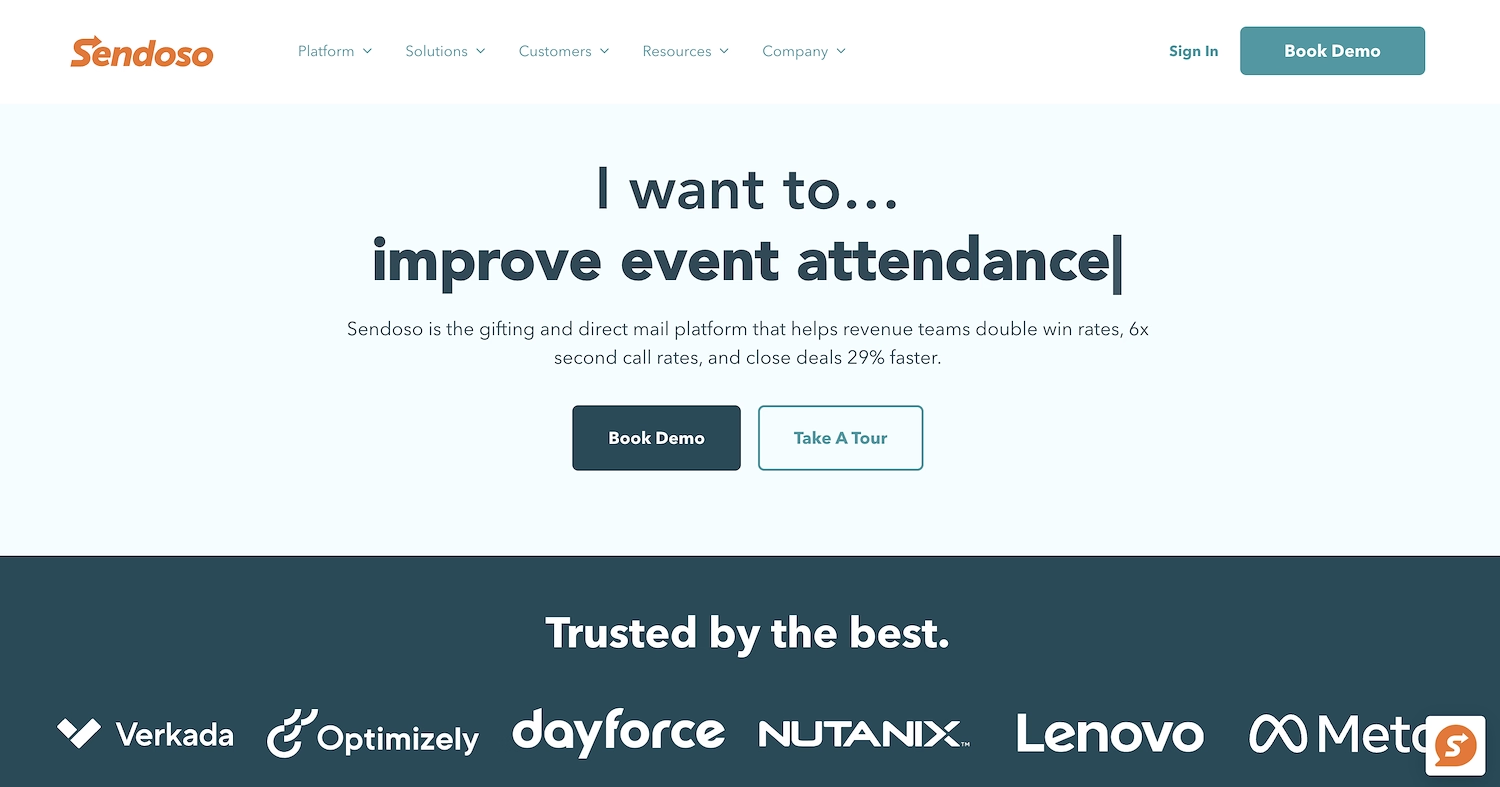
Sendoso is a platform for revenue teams to manage direct mail, gifts, and swag. It supports personalized, data-driven outreach for sales, marketing, and customer success teams in B2B organizations.
The platform is for account-based marketing campaigns, demand generation programs, and sales outreach. Sendoso claims its customers double win rates and close deals 29% faster by the integration of gifts and direct mail.
Sendoso's Main Features
- Automates gifting within existing GTM tech stacks through over 90 native integrations.
- Provides AI-powered “SmartSend” recommendations for personalized and timely gifts.
- Manages global storage, kitting, and fulfillment through its owned and operated warehouses.
- Offers full-stack reporting and real-time dashboards for campaign attribution.
Sendoso vs. Alyce: Key Differences
Average Review score: 4.5/5 stars based on 1,176 G2 reviews.
- Sendoso provides a wider variety of gifts through its large marketplace and an Amazon integration, offering more flexibility than Alyce's more curated selection.
- The platform manages its own global warehouses for storage and fulfillment, which supports international campaigns and addresses the geographical limits found in Alyce.
- With over 90 native integrations, it connects with many CRM and marketing automation tools, allowing for deep automation within existing workflows.
- Its features include direct mail design and automation, giving teams tools to manage physical mail campaigns, a focus that is more developed than in Alyce.
Sendoso's Limitations Compared to Alyce
- Some users find Sendoso's interface complex and note it has a learning curve, which is different from Alyce's focus on ease of use.
- The platform sometimes requires address confirmations from recipients, which can add an extra step to the gifting process compared to Alyce's more direct approach.
- Its pricing, particularly for shipping and certain items, can be higher. This contrasts with Alyce, where costs are often tied to gift acceptance, which may offer more budget control.
- Users occasionally report slow or inconsistent delivery times for physical gifts, which can be a factor for time-sensitive campaigns.
Pricing and Cost-Effectiveness
Sendoso does not publish its pricing, but user reviews place its perceived cost in the highest tier, similar to Alyce. This suggests both are premium-priced platforms. For an exact quote based on your needs, you will need to contact Sendoso's sales department.
2) Reachdesk
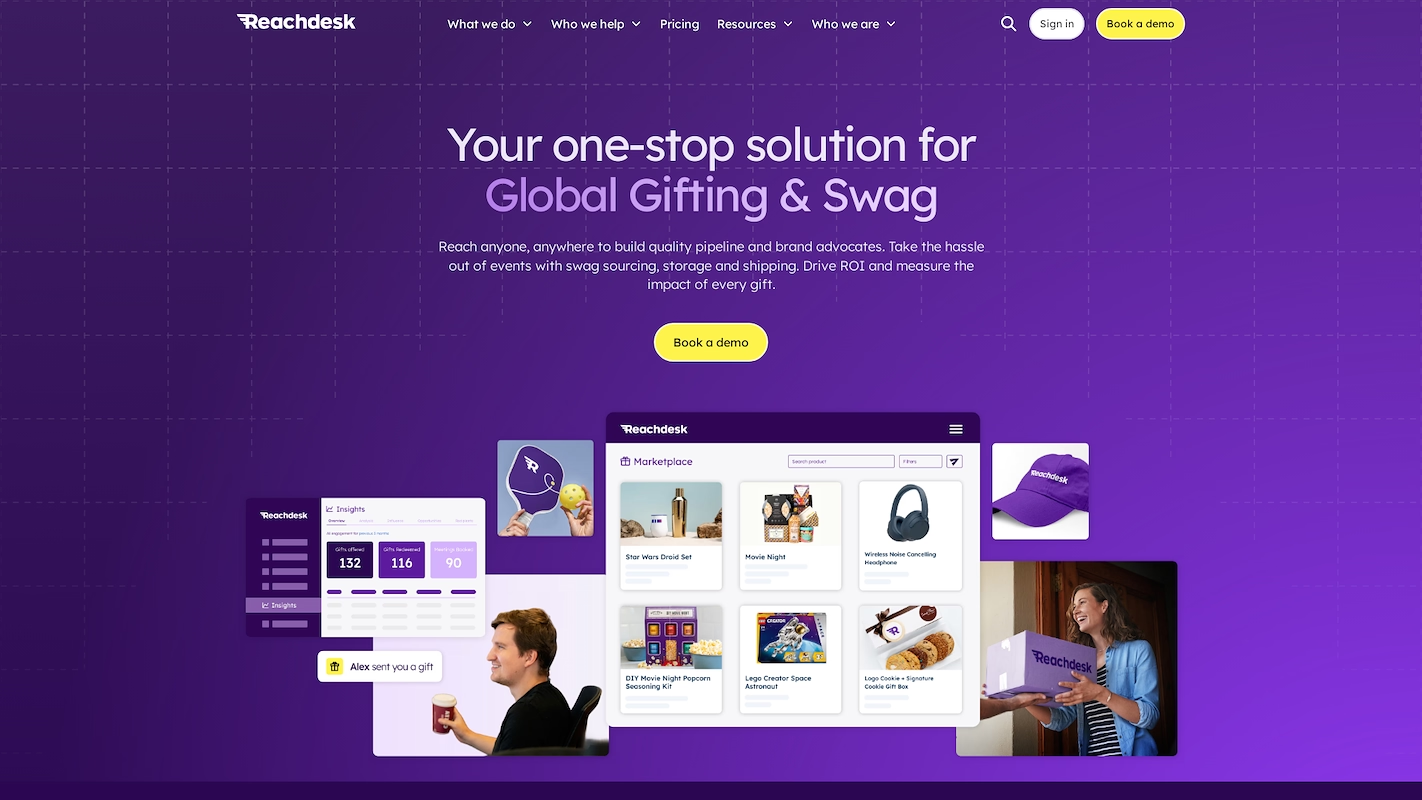
Reachdesk is a platform for global corporate gifts and swag management. It allows revenue, marketing, and customer success teams to send physical items, eGifts, and merchandise to over 180 countries. The system connects with CRM and marketing automation tools for full tracking.
This helps teams measure the impact on pipeline and revenue while they control budgets. The platform supports SDR outreach and ABM campaigns to capture attention and lift close rates.
Reachdesk's Main Features
- Offers a global marketplace with a curated catalog of gifts, eGifts, and merchandise available in over 180 countries.
- Manages swag sourcing, inventory tracking, storage, and distribution with a model that avoids middlemen and hidden fees.
- Provides event fulfillment services that cover pre-event storage, on-site shipping, and logistics for virtual and in-person events.
- Includes creative services with in-house strategists to help design and execute gifting campaigns aligned with business goals.
Reachdesk vs. Alyce: Key Differences
Average Review score: 4.4/5 stars based on 907 G2 reviews.
- Reachdesk supports gifting in over 180 countries, which provides a more extensive global reach than Alyce's service, which has some geographical limits.
- The platform includes full swag management with inventory tracking and storage, a different focus from Alyce, which centers on curated gift choices.
- It offers dedicated event fulfillment for both virtual and in-person events. This is a specialized service not central to Alyce's platform.
- This tool provides creative services with in-house strategists to help design campaigns, offering a different level of support compared to Alyce's user-driven personalization.
Reachdesk's Limitations Compared to Alyce
- Alyce allows recipients to choose their own gift, which offers a high degree of personal choice. Reachdesk's model is different, as it centers on the sender selecting a specific item from a marketplace for the recipient.
- Some users find the Reachdesk platform can be complex to navigate. This is different from Alyce, which is often noted for its straightforward and simple user interface.
- The platform's pricing can include fees for packing and shipping that are separate from the gift's cost. This contrasts with Alyce's model, where costs are often tied directly to the recipient accepting a gift.
Pricing and Cost-Effectiveness
According to user reviews, both Reachdesk and Alyce are in the highest perceived cost tier. For the most accurate and up-to-date pricing information, we recommend visiting Reachdesk's official website, as pricing models can vary significantly between tools.
3) Postal
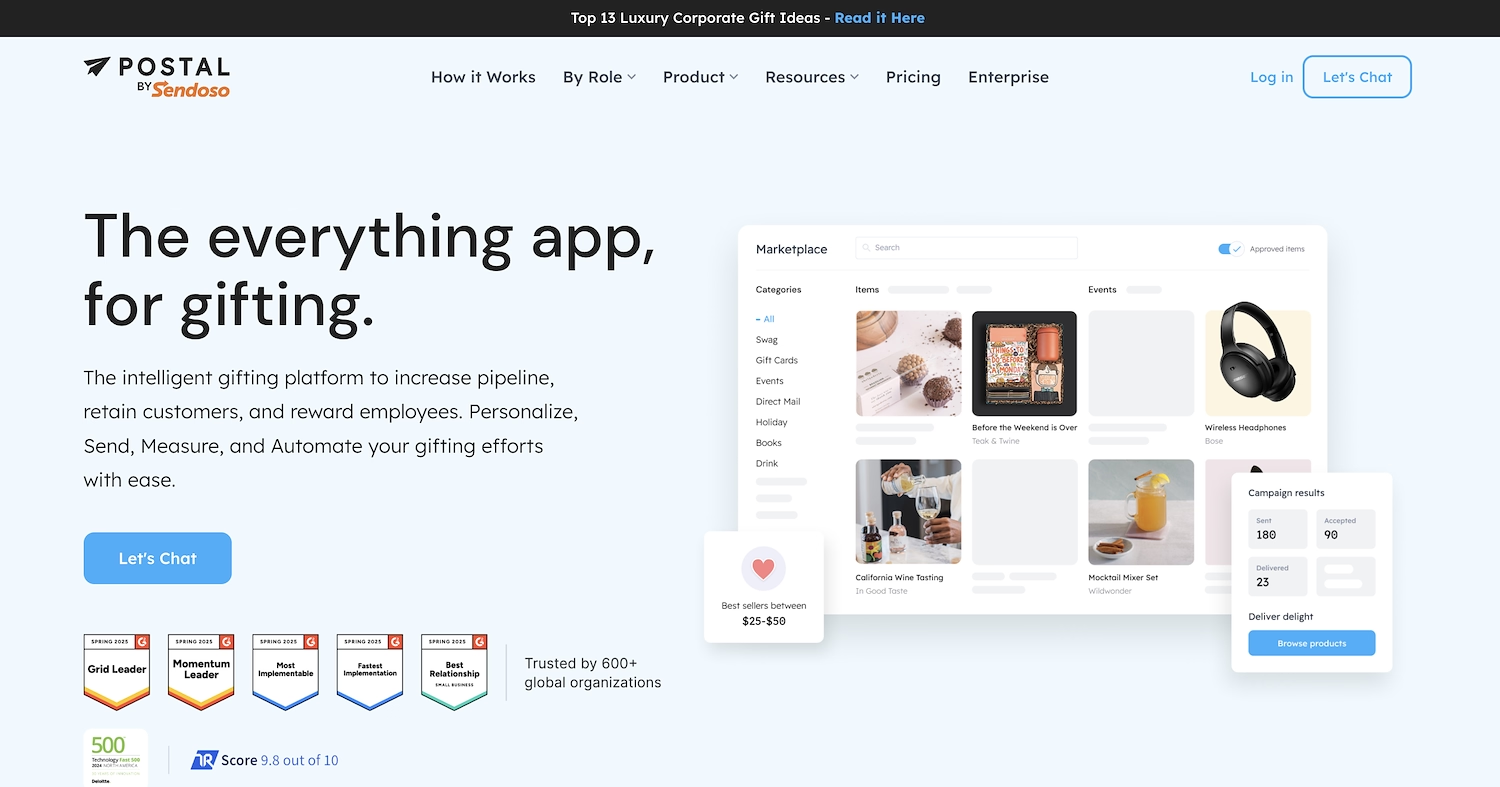
Postal is a platform for corporate gifts that helps businesses send and automate physical items. It supports direct mail outreach with on-demand cards and packages to increase pipeline and accelerate deals. The system offers a global marketplace and integrates with existing go-to-market technology stacks to measure results.
Postal's Main Features
- Automates direct mail outreach by sending on-demand cards and packages.
- Offers an in-house creative agency, Paper Plane, to design bespoke gifts and packaging.
- Provides a dedicated campaign dashboard for managing and executing account-based marketing programs.
- Includes a feature to book and deliver virtual and experiential gifts.
Postal vs. Alyce: Key Differences
Average Review score: 4.5/5 stars based on 405 G2 reviews.
- Postal provides an in-house creative agency, Paper Plane, to design custom gifts and packaging. This offers a different type of support compared to Alyce's user-driven personalization.
- The tool automates direct mail with on-demand cards and packages. This feature is more developed than in Alyce, which centers on individual, personalized gifts.
- It includes options to book and deliver virtual and experiential gifts. This expands the gift types beyond the curated physical and digital items available in Alyce.
- This platform offers a dedicated dashboard to manage and execute account-based marketing programs, providing a more centralized view for campaigns than Alyce's integration-focused approach.
Postal's Limitations Compared to Alyce
- Postal's model focuses on the sender selecting the gift. This is different from Alyce, where the recipient has the final choice, which ensures they get something they truly want.
- Some users report that the platform can be complex to navigate. This contrasts with Alyce, which is often noted for its simple and user-friendly interface that requires less training.
- The tool sometimes has fewer options for personal touches. For example, not all items in the marketplace allow for a custom card, which is a core part of Alyce's highly personalized approach.
Pricing and Cost-Effectiveness
User reviews place both Postal and Alyce in the highest perceived cost tier. However, pricing models can vary significantly. For the most accurate and up-to-date information, we recommend visiting Postal's official website.
4) Loop & Tie
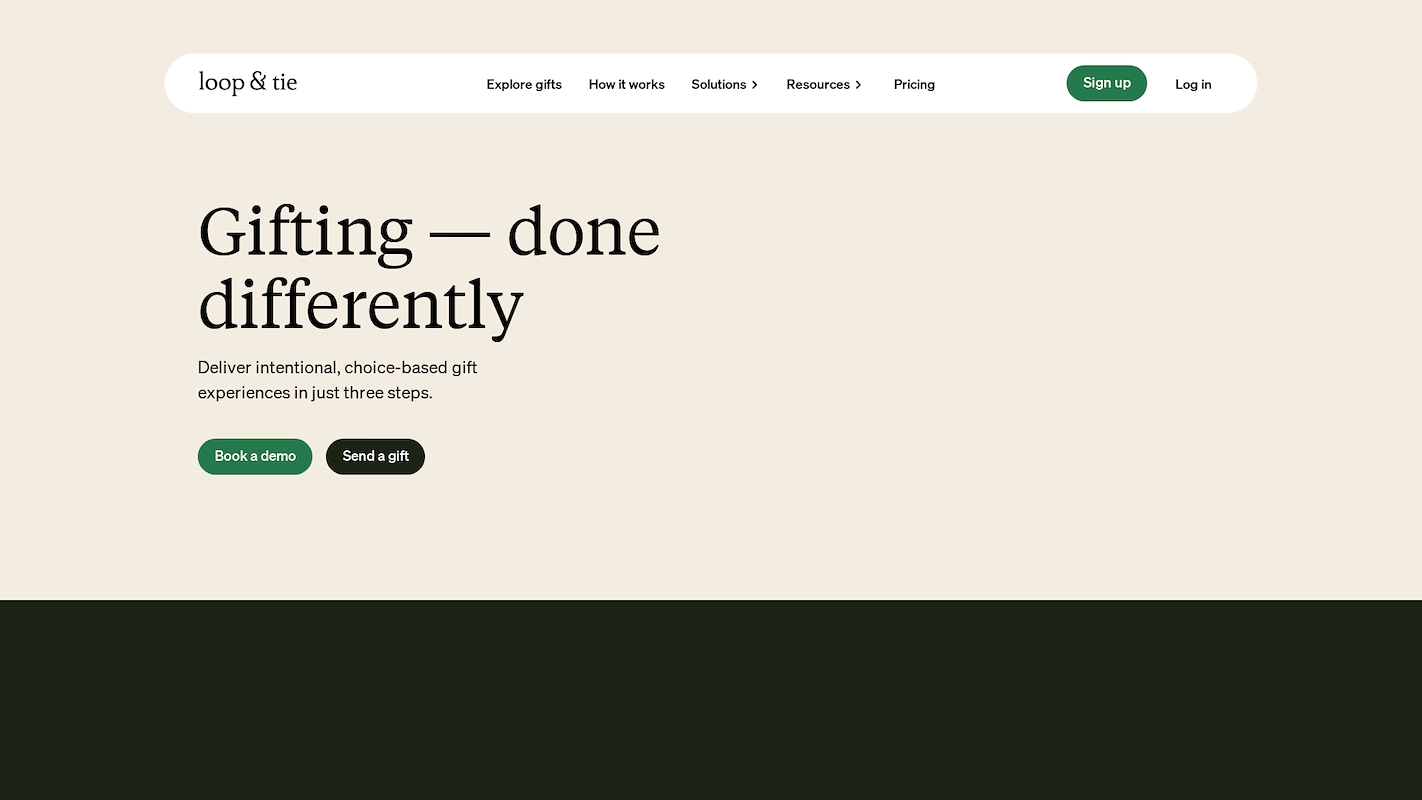
Loop & Tie is a corporate gift platform where recipients choose their own present. It helps companies with direct mail outreach by sending a collection of items for the contact to select from. This method lets businesses connect with an audience through a gift they want.
The platform is an option for teams that want to build relationships through a choice-based gift experience.
Loop & Tie's Main Features
- Offers a choice-based gifting engine that sends a single link for recipients to select a gift from a curated collection.
- Provides a marketplace with a focus on sustainability, featuring reusable packaging and products from small or women-owned businesses.
- Includes automation tools to create campaigns for recurring events such as birthdays and anniversaries.
- Features a native Salesforce application that allows users to send and track gifts directly within the CRM.
Loop & Tie vs. Alyce: Key Differences
Average Review score: 4.8/5 stars based on 14 G2 reviews.
- Loop & Tie places a strong emphasis on sustainability, offering gifts from small businesses and a carbon-regenerative model. This is a different focus compared to Alyce, which centers on user-driven personalization.
- The platform provides a free pricing tier for a single user. This offers a different entry point for smaller teams, as Alyce is generally considered a premium-priced solution.
- It includes a native Salesforce application to send and track gifts directly within the CRM. This provides a slightly more integrated experience for Salesforce users than Alyce's broader integration approach.
- This tool offers specific automation for recurring events like birthdays and anniversaries. This is a more specialized feature than the general campaign automation described for Alyce.
Loop & Tie's Limitations Compared to Alyce
- Alyce is often noted for its simple user interface. In contrast, some users find that switching between the gifting and supplier views within Loop & Tie can be confusing.
- The tool's gift catalog sometimes does not refresh frequently enough. This is different from Alyce's model, which focuses on a consistently updated, curated selection of gifts.
- Loop & Tie occasionally has fewer options for customizing its branded portal. This may feel less flexible compared to Alyce's highly user-driven personalization features.
Pricing and Cost-Effectiveness
Loop & Tie provides a free plan for a single user, offering an accessible entry point that Alyce does not. For paid plans, both platforms require custom quotes, placing them in a similar premium category. For detailed pricing, you should visit Loop & Tie's official website.
5) Giftpack
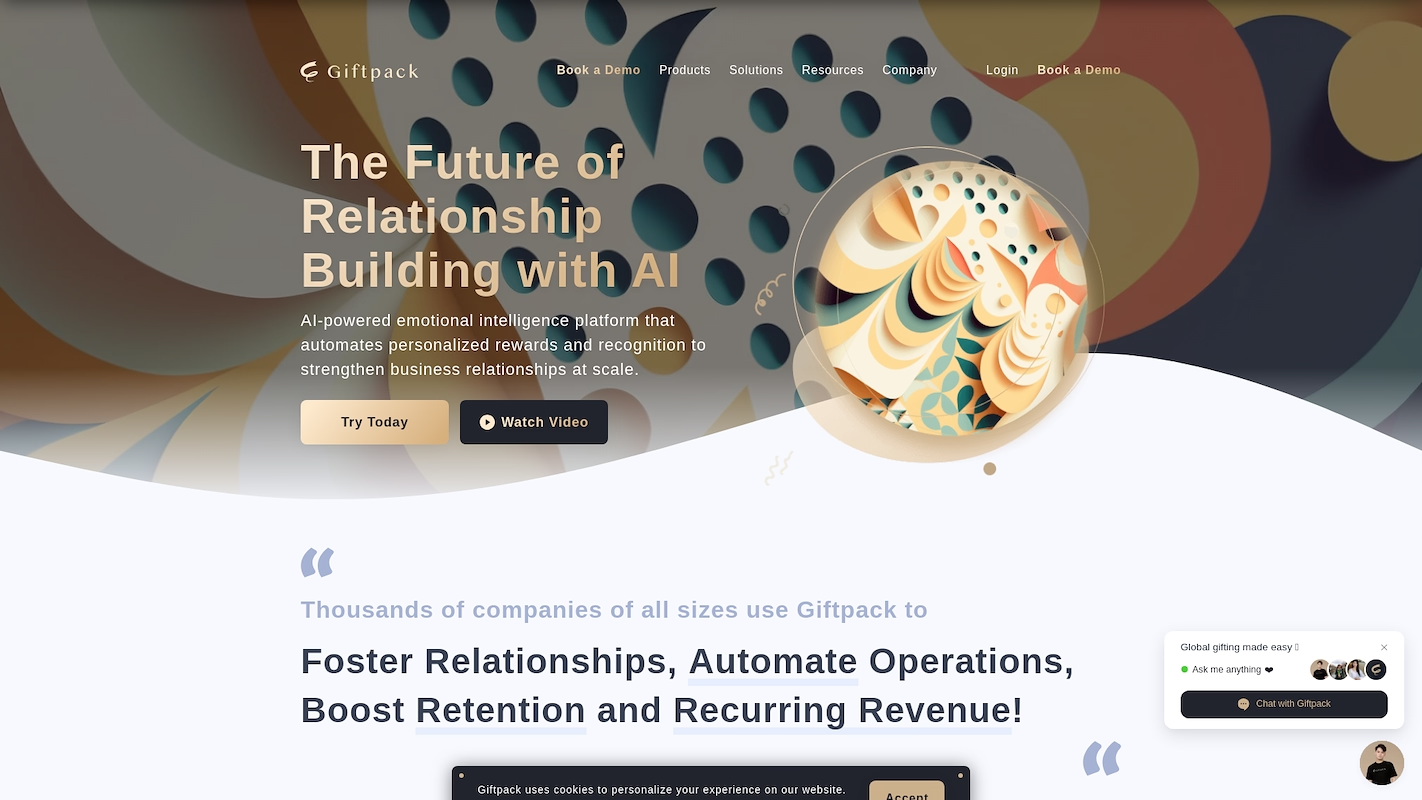
Giftpack is a corporate gift platform that uses AI to automate global campaigns. The system analyzes a recipient's digital footprint to select a suitable present for them.
This function supports direct mail outreach to prospects. The platform handles delivery to more than 200 countries, which helps with international contacts.
Giftpack's Main Features
- Analyzes recipient data with an AI emotional-intelligence engine to recommend gifts and messages.
- Uses an AI visual and 3D engine to add logos and create custom packaging.
- Launches a global, points-based rewards program with support for corporate top-ups.
- Creates branded company stores backed by its supply chain.
Giftpack vs. Alyce: Key Differences
Average Review score: 4.0/5 stars based on 21 G2 reviews.
- Giftpack uses an AI engine to analyze a recipient's digital footprint and recommend a gift. This is different from Alyce, where the recipient makes the final gift choice.
- The platform supports gift delivery to over 200 countries. This offers a broader international reach compared to Alyce, which has some geographical limits.
- It offers a freemium plan and a premium tier that starts at a lower price. This provides a more accessible entry for smaller teams than Alyce, which is positioned as a premium-priced solution.
- This tool includes an AI engine to help create custom packaging and add logos. This is a more specific design feature than the user-driven personalization options in Alyce.
Giftpack's Limitations Compared to Alyce
- Giftpack uses an AI engine to select a gift for the recipient. This is different from Alyce, where the recipient has the final choice, which ensures they get something they truly want.
- The platform's reliance on AI for gift selection can sometimes feel less direct. This contrasts with Alyce, which is often noted for its simple user interface and straightforward gifting process.
- An AI-selected gift may not always feel as personal to the recipient. Alyce's model, which empowers the recipient to choose, can create a stronger feeling of personal connection.
Pricing and Cost-Effectiveness
Giftpack provides a freemium plan and a premium tier starting at $29.99 per month, offering a more accessible entry point than Alyce. Alyce does not have a free option and is priced as a premium solution, requiring a custom quote for its enterprise-focused plans.
Consider 11x for Your Sales Process
If your sales process can benefit from autonomous agents for tasks like lead research and outreach, 11x is a relevant option. The platform allows your team to focus on closing deals while digital workers manage the top of the funnel. Visit their site for a demo.
With 11x, we use AI to run your sales playbook. Our agent Alice finds accounts and handles outreach, while Julian qualifies leads and schedules meetings. The platform consolidates your GTM stack, replacing separate tools for data enrichment or email warmup.
Book a demo to see the platform in action.
6) Snappy
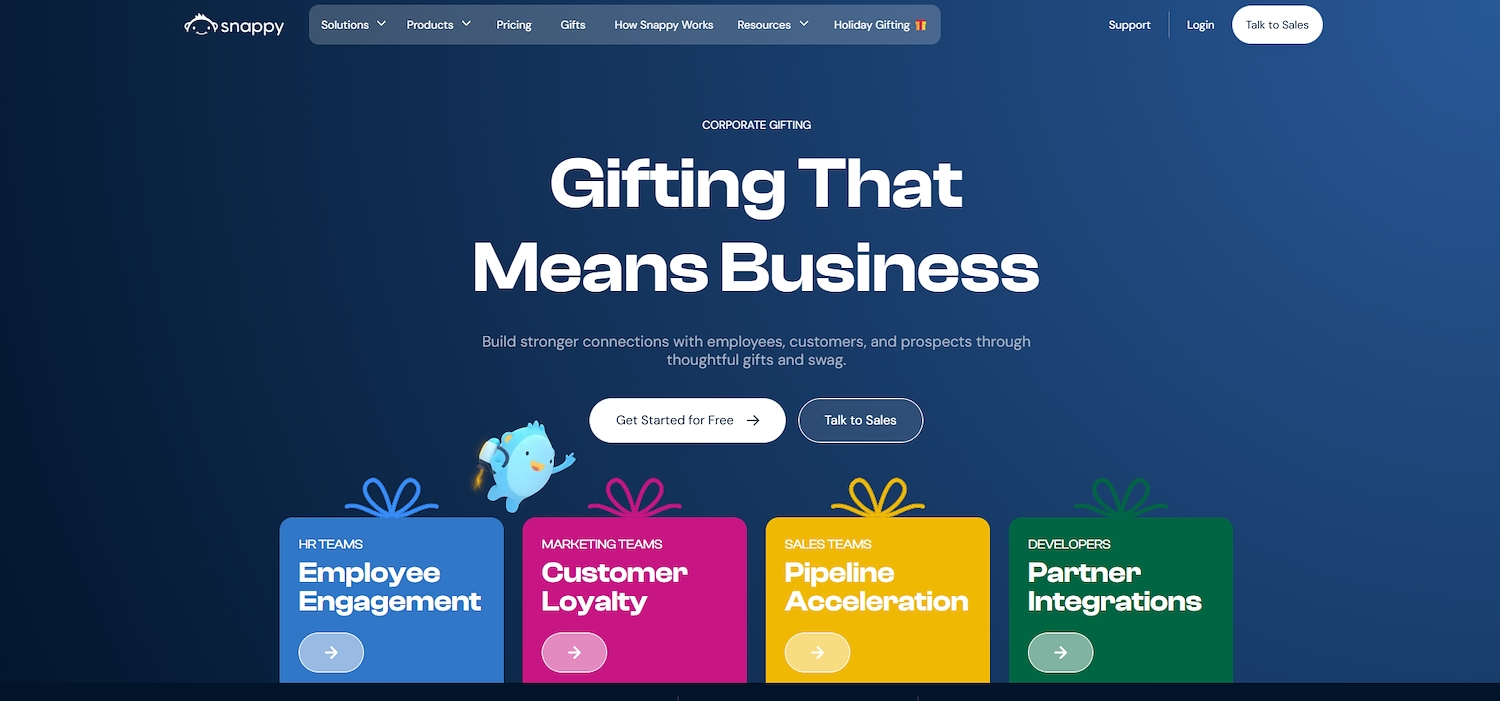
Snappy is a corporate gift platform for direct mail outreach. It allows businesses to send a collection of gift options to prospects and customers. The recipient then chooses the item they prefer.
This choice-based model helps sales and marketing teams connect with contacts. The platform manages the entire process, from the initial send to the final delivery of the chosen gift.
Snappy's Main Features
- Includes automated gifting to schedule and trigger sends for events like birthdays, anniversaries, and sales milestones.
- Provides plug-and-play HRIS integrations to connect with HR systems for employee recognition programs.
- Offers an API suite that allows for custom workflows and white-label embeds into other applications.
- Features self-serve, company-branded swag stores that operate with points or cash.
Snappy vs. Alyce: A Direct Comparison
Average Review score: 4.8/5 stars based on 310 G2 reviews.
- Snappy provides plug-and-play HRIS integrations. This allows for automated employee recognition, a feature more specialized than Alyce's focus on sales and marketing campaigns.
- The platform includes an API suite for custom workflows. This gives developers more control to embed gifting into other applications compared to Alyce's standard integrations.
- It features self-serve, company-branded swag stores that operate with points or cash. This provides a different way to manage merchandise compared to Alyce's curated gift-sending model.
- This tool automates sends for recurring events like birthdays and anniversaries. This is different from Alyce, where gifting is often tied to specific, non-recurring touchpoints in a sales cycle.
Snappy's Limitations Compared to Alyce
- Snappy sends a collection of gifts for the recipient to choose from. This is different from Alyce, where a sender suggests one specific, researched gift, which can create a more personal touch for one-to-one sales outreach.
- The tool does not include a charity donation option. In Alyce, a recipient can choose to donate the gift's value to a charity, which provides an alternative to a physical item and can align with personal values.
- Its cost structure is based on the budget set for a gift collection. This contrasts with Alyce's model, where companies often pay only when a gift is accepted, which can offer more direct control over campaign spending.
Pricing and Cost-Effectiveness
While we've covered key features and use cases in this comparison, pricing models can vary significantly between tools. For the most accurate and up-to-date pricing information, we recommend visiting Snappy's official website.
7) Thnks
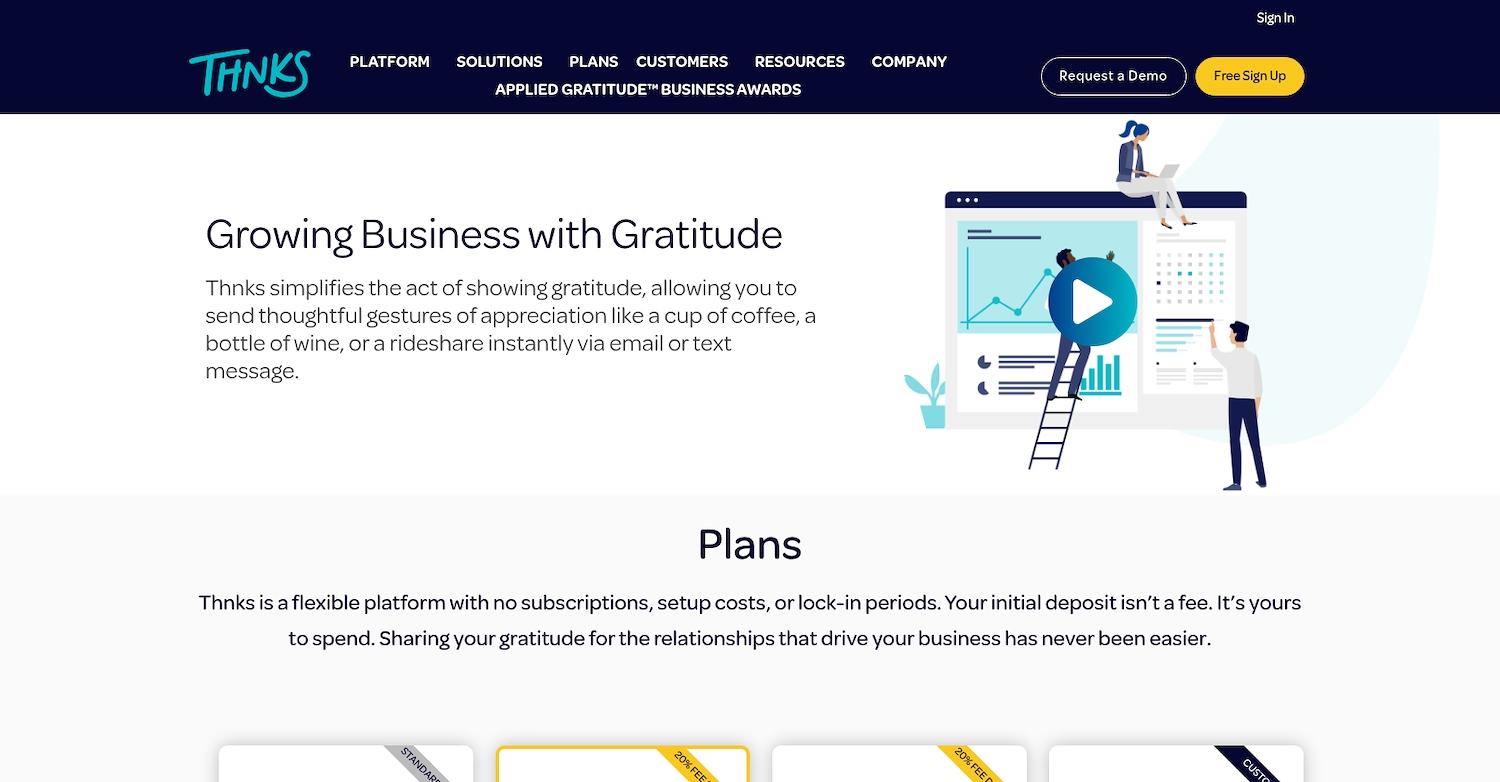
Thnks is a platform for direct mail outreach that uses gratitude to build business relationships. It allows teams to send items to prospects, clients, and partners to support sales and marketing efforts.
The system is designed to deliver gestures of appreciation as part of a company's outreach strategy.
Thnks's Main Features
- Delivers gifts instantly by email or SMS from a curated catalog.
- Provides full functionality for on-the-go gifting through native iOS and Android applications.
- Includes compliance controls for administrators to set gift limits, budgets, and policy rules.
- Maintains security with ISO 27001 certification and third-party cybersecurity audits.
Thnks vs. Alyce: A Direct Comparison
Average Review score: 4.6/5 stars based on 36 G2 reviews.
- Thnks provides native iOS and Android applications for full gifting functionality on the go. This is different from Alyce, which operates primarily as a web-based platform.
- It includes detailed compliance controls for administrators to set gift limits and policy rules, offering a more granular level of budget management than Alyce's campaign-focused cost structure.
- The platform delivers gifts instantly by email or SMS. This provides a more immediate delivery channel compared to Alyce's standard email-based gift invitation process.
- This tool maintains ISO 27001 certification and undergoes third-party security audits, offering a specific security assurance not prominently featured by Alyce.
Thnks's Limitations Compared to Alyce
- Thnks does not allow the recipient to choose their own gift. This is different from Alyce, where the recipient's choice is central and can even include donating the gift's value to a charity.
- The platform's focus is on sending gestures of appreciation from a catalog. This contrasts with Alyce's model, where a single, researched gift suggestion creates a more personal touch for one-to-one sales outreach.
- It does not offer the same level of deep integration with sales and marketing platforms. Alyce, in comparison, is built to track the influence of a gift on revenue and pipeline within existing workflows.
Pricing and Cost-Effectiveness
Thnks provides a "Pay As You Go" model for all its plans, offering more budget flexibility than Alyce's premium, quote-based structure. This makes Thnks a potentially more cost-effective option for teams wanting to avoid large upfront platform fees.
8) SwagUp
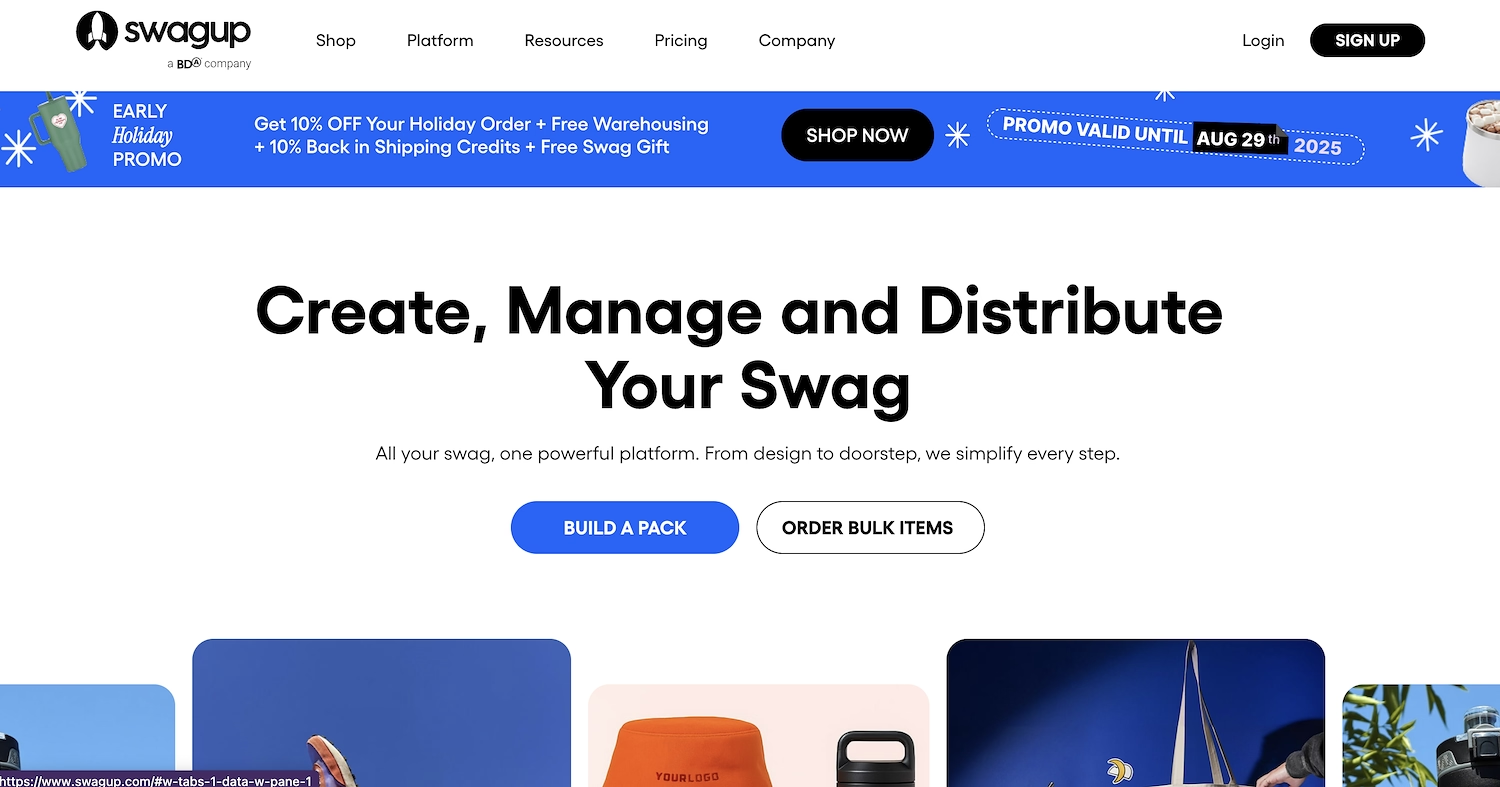
SwagUp is a platform to create and automate company swag. It helps businesses design, produce, and distribute merchandise for direct mail outreach. The service manages inventory and ships custom swag packs globally for events or marketing campaigns.
SwagUp's Main Features
- Manages warehousing, procurement, and fulfillment for company swag.
- Provides reporting on spend and conversion rates.
- Includes a proof portal as part of its platform functionality.
SwagUp vs. Alyce: A Direct Comparison
Average Review score: 4.4/5 stars based on 98 G2 reviews.
- SwagUp provides end-to-end swag management, from design to distribution. This is different from Alyce, which focuses on sending individual, curated gifts rather than managing a company's own merchandise inventory.
- It offers dedicated warehousing and fulfillment for company swag. This contrasts with Alyce's model, where gift sending does not involve storing a client's own branded items.
- The platform allows companies to create their own branded swag stores. This provides a self-service option for employees or events, a feature not available in Alyce's gift-sending workflow.
- This tool includes a proof portal for approving swag designs before production. This is a specific function for custom merchandise creation that is not part of Alyce's process for selecting pre-existing gifts.
SwagUp's Limitations Compared to Alyce
- SwagUp's model centers on sending company-branded items. This is different from Alyce, where the recipient chooses their own gift, which can feel more personal and ensures they receive something they want.
- The platform does not include a charity donation option. In Alyce, a recipient can choose to donate the gift's value, which provides an alternative that may align better with their personal values.
- It is less focused on one-to-one sales outreach. Alyce, in comparison, uses research to suggest a single, personal gift to an individual, a method designed to open doors with key prospects.
Pricing and Cost-Effectiveness
User reviews place both SwagUp and Alyce in the highest perceived cost tier. While we've covered key features and use cases in this comparison, pricing models can vary significantly between tools. For the most accurate and up-to-date pricing information, we recommend visiting SwagUp's official website.
9) CorporateGift.com
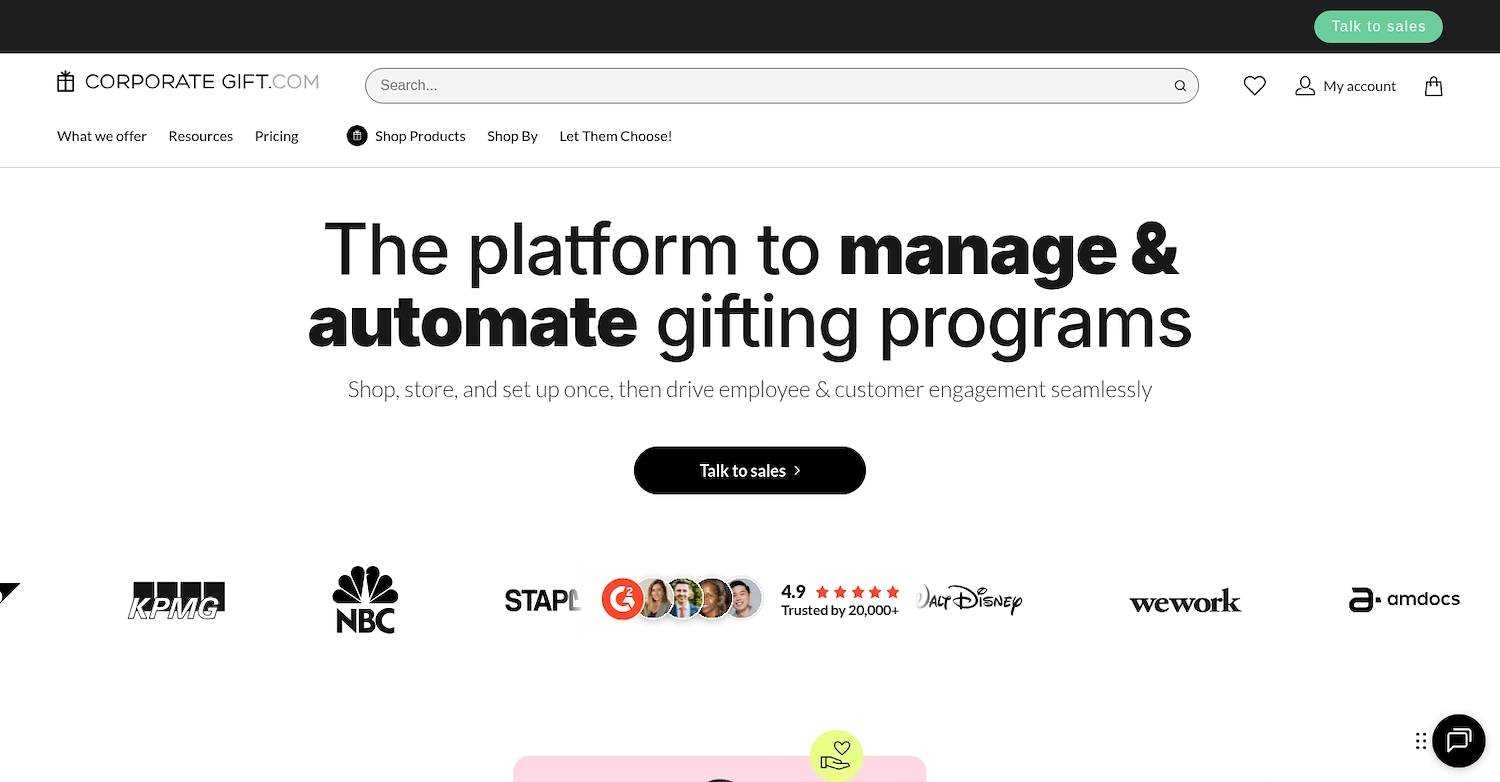
CorporateGift.com is a platform for corporate gifts that supports direct mail outreach. It allows companies to send items to prospects, clients, and partners. Businesses use the service to manage gifting campaigns for sales acceleration, account-based marketing, and customer retention. The system provides a marketplace of gift options for various business purposes.
CorporateGift.com's Main Features
- Includes a content library and automation tools to manage and execute gifting programs.
- Provides platform mobility for managing gifts from different devices.
- Offers corporate discounts to help control the overall cost of gifting initiatives.
- Features a dashboard with reporting to track campaign performance and engagement.
CorporateGift.com vs. Alyce: Key Differences
Average Review score: 4.8/5 stars based on 164 G2 reviews.
- CorporateGift.com provides corporate discounts on items. This offers a different way to manage costs compared to Alyce, where pricing is often tied to gift acceptance.
- The platform includes a content library to help manage gifting programs. This is a different type of support from Alyce, which focuses on user-driven research for individual gifts.
- It offers platform mobility for managing gifts from different devices. This provides more flexibility than Alyce, which operates primarily as a web-based platform.
- This tool has a "Pay As You Go" pricing model. This gives teams more budget flexibility than Alyce's premium, quote-based structure.
CorporateGift.com's Limitations Compared to Alyce
- CorporateGift.com uses a sender-led model where the company selects the gift. This is different from Alyce, where the recipient makes the final choice, which ensures they get something they truly want.
- The platform does not have a feature for researching a recipient to suggest one specific, personal gift. Alyce, in contrast, centers its approach on this one-to-one personalization to help open doors with key contacts.
- It does not offer a charity donation option. Alyce allows a recipient to donate the gift's value instead, which provides an alternative that may align better with a person's individual values.
Pricing and Cost-Effectiveness
CorporateGift.com provides a "Pay As You Go" model and an individual plan at $2,388 per year. This offers more budget flexibility than Alyce's premium, quote-based structure, making it a more accessible option for teams that want to avoid large upfront platform fees.
10) Giftsenda
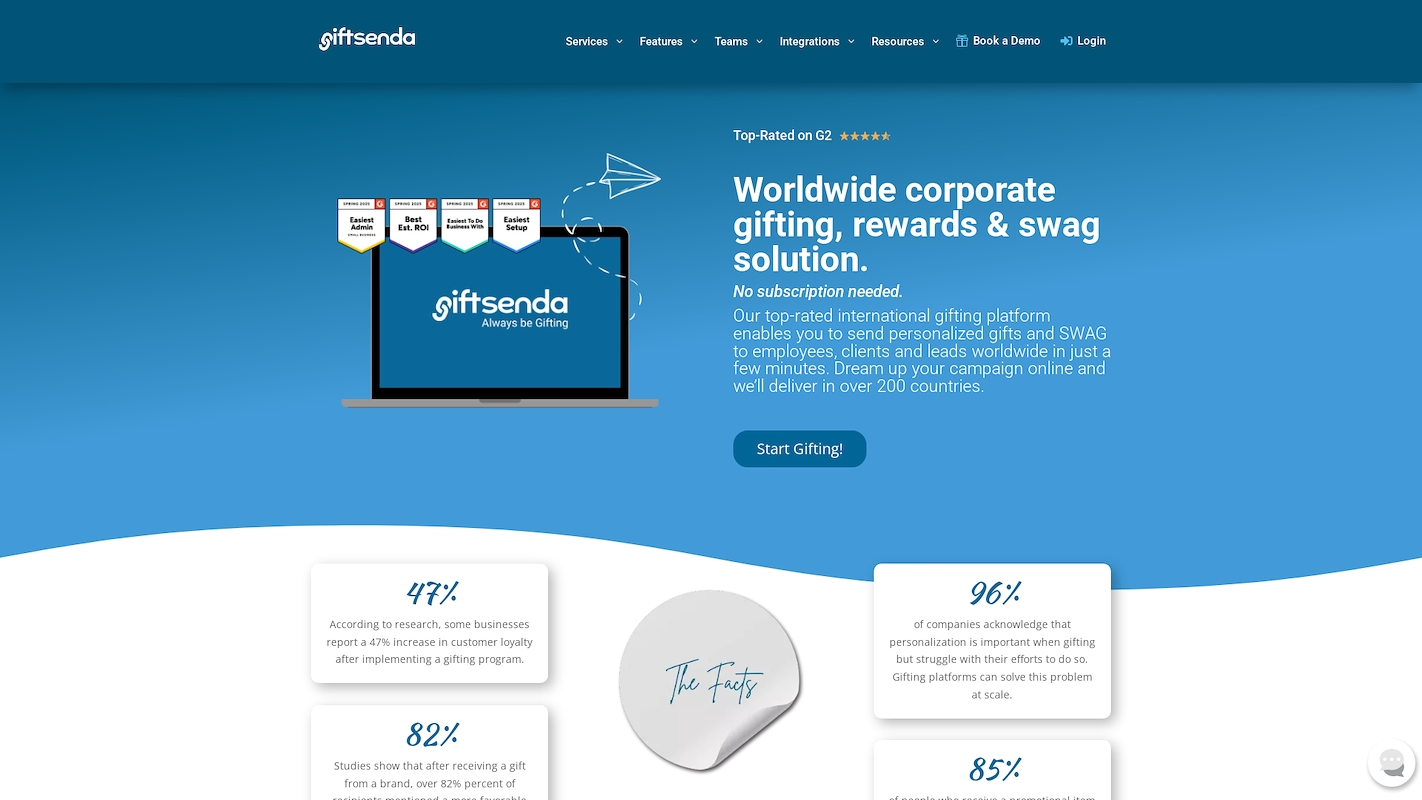
Giftsenda is a corporate gift platform that supports direct mail outreach. The service allows companies to send items to prospects and clients to build business relationships. It helps sales and marketing teams manage gift campaigns on a global scale.
Giftsenda's Main Features
- Integrates with CRM and marketing automation platforms for use in existing workflows.
- Provides dashboards and reporting to track campaign performance.
- Manages mailing lists and allows for custom batch sizes for sending.
- Includes direct mail design services along with testing and tracking capabilities.
Giftsenda vs. Alyce: Key Differences
Average Review score: 4.7/5 stars based on 20 G2 reviews.
- Giftsenda delivers gifts to over 200 countries. This provides a wider global reach compared to Alyce, which has some geographical restrictions.
- The platform includes direct mail design services. This is a different focus from Alyce, which centers on sending curated, pre-existing gifts.
- It allows for custom batch sizes for sending campaigns. This supports large-scale outreach, which is different from Alyce's approach that often centers on individual, one-to-one gifting.
- This tool offers a "Pay As You Go" model and supports once-off campaigns. This provides more budget flexibility than Alyce's premium, quote-based structure which is designed for ongoing programs.
Giftsenda's Limitations Compared to Alyce
- Giftsenda uses a sender-led model where the company selects the gift. This is different from Alyce, where the recipient makes the final choice, which can create a more personal experience.
- The platform does not offer a charity donation option. Alyce provides this choice, which allows a recipient to donate the gift's value instead of receiving a physical item.
- Its approach is less focused on one-to-one outreach. This contrasts with Alyce, which uses research to suggest a single, personal gift to an individual to help start a conversation.
Pricing and Cost-Effectiveness
Giftsenda offers a "Pay As You Go" model and supports once-off campaigns, providing more budget flexibility than Alyce's premium, quote-based structure. This makes Giftsenda a more accessible option for teams that want to avoid large upfront platform fees.
Which One Should You Go With?
Choosing the right Alyce alternative depends on your specific business needs, budget, and campaign goals. This guide reviewed several platforms to help you evaluate your options and make an informed decision.
If your goal is to add digital workers to your sales process, 11x is a relevant option. The platform provides autonomous agents for tasks like lead research and outreach, allowing your sales team to focus on closing deals.




